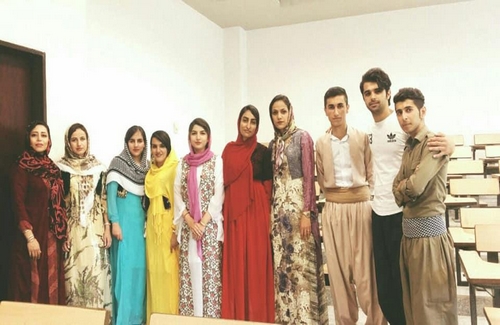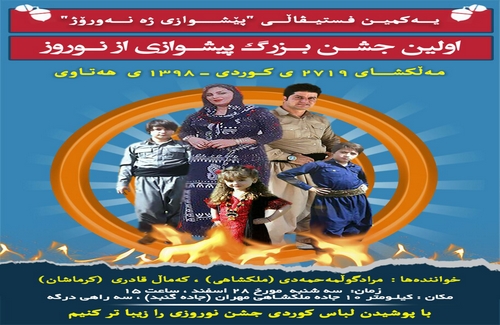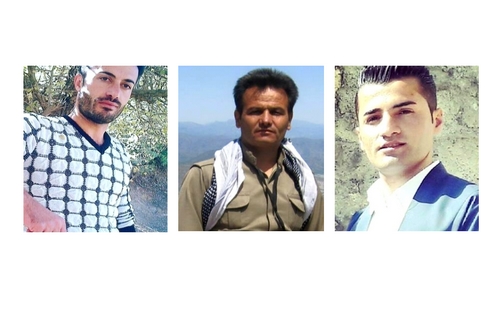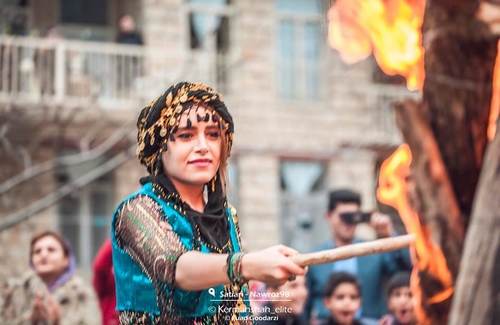Iranian Kurdish film ‘Rhino Season’ is a poetic tale of lust and loss
05:38 - 23 July 2015
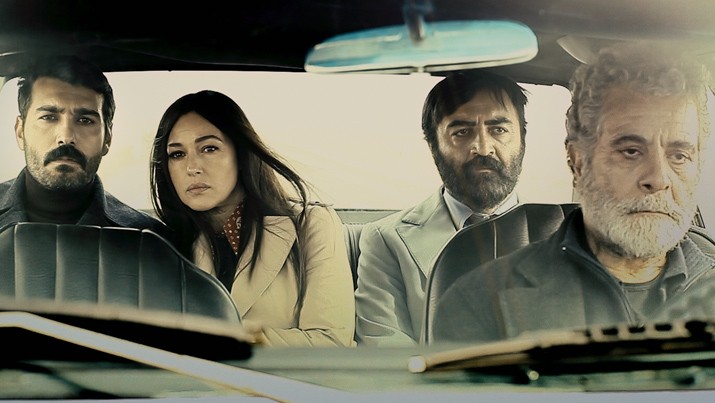
BY: KAORI SHOJI
FOR THE JAPAN TIMES
Unlike Iranian film giants Abbas Kiarostami and Mohsen Makhmalbaf, Iranian-Kurdish filmmaker Bahman Ghobadi is little known outside Iran and the European film-festival circuit. But that’s a huge loss to the movie world, as every single one of his works are unforgettable animals, leaving permanent claw marks on the memory.
His last work, “No One Knows About Persian Cats,” (2009) won the special jury prize at the Cannes film festival and alerted the world to the plight of young Iranian artists and musicians trying to get out of the country. Ghobadi had always been in a dicey political position because of his Kurdish background, but “Persian Cats” put Ghobadi’s name right on top of the Iranian government’s blacklist. He was chased out by the military police and now lives and works in Turkey.
“Rhino Season” (released originally in 2012 as “Fasle Kargadan”) is the first film Ghobadi has made in exile. The depth and range of his visual imagination astonishes the senses, like a lover’s caress and a punch to the face at the same time. Through the film we get a glimpse of what defines a human being after basic rights have been stripped away along with the trappings of money and status. We see the toxic, devastating effect that can be brought about by envy and betrayal. But, ultimately, it’s a love story between a husband and wife who have been separated for 30 years, and are haunted by their younger selves.
Monica Bellucci stars as Mina, the wealthy daughter of an Iranian businessman, who marries poet Sahel (Behrouz Vossoughi) in Tehran in 1979. The revolution, which will overthrow the shah, is underway, but the couple is more or less oblivious to the political turmoil happening all around them. They have eyes only for each other, but love proves to be their undoing. Sahel is arrested for publishing a book of “treasonous” poetry and sentenced to life in prison. Mina is arrested as well, and sentenced to 10 years. It turns out that Mina’s chauffeur, Akbar (Yilmaz Erdogan), engineered this whole tragedy, as he had always lusted after Mina and was seething with jealousy over her marriage.
When Sahel is finally released nearly 30 years later he’s determined to find Mina and rekindle their relationship. As for Mina, she has wound up in Turkey with two grown sons, convinced that Sahel had died in prison long ago.
Casting Italian goddess Bellucci in the role of Mina was a stroke of genius — no Islamic actress would be willing or allowed to shed their clothing as Bellucci does, or express such heights of sexuality. Her presence highlights one of the underlying messages in “Rhino Season”: Iran is becoming a wasteland for artistic talent and expression, leaving artists and filmmakers no choice but to leave the country and work elsewhere. Vossoughi used to be one of Iran’s biggest actors before fleeing the country around the time of the revolution. He now lives in the U.S. The point is brought home by the fact that the film was inspired by the life of Sadegh Kamangar, a pseudonym for an Iranian-Kurdish poet who was incarcerated for 27 years for writing an innocuous book of poems. His verse is recited in “Rhino Season” by Bellucci.
At the Toronto International Film Festival, Ghobadi said that he wasn’t “interested in politics per se,” and that his films are not political. But as an Iranian who is also an ethnic Kurd, politics will probably continue to shadow his stories whatever his intentions or admissions. “Rhino Season” is dedicated to political prisoners around the world and Sahel’s ghostly presence, always lurking at the periphery of the film — speaks volumes about their fate. Sahel’s entire life has been stolen, and nothing will ever be the same. When he finally locates Mina in Istanbul, he doesn’t go see her right away, but just sits in his car, looking out at the river. It’s a powerful, memorable scene, and one of many.
Source: The Japan Times
###
Stay in touch with Kurdpa with latest news and opinions on Iran and Kurdistan:
Follow @kurdpa
Email us your news tips, pictures, video, opinions and articles to english(a)kurdpa.com
Share this article:
FOR THE JAPAN TIMES
Unlike Iranian film giants Abbas Kiarostami and Mohsen Makhmalbaf, Iranian-Kurdish filmmaker Bahman Ghobadi is little known outside Iran and the European film-festival circuit. But that’s a huge loss to the movie world, as every single one of his works are unforgettable animals, leaving permanent claw marks on the memory.
His last work, “No One Knows About Persian Cats,” (2009) won the special jury prize at the Cannes film festival and alerted the world to the plight of young Iranian artists and musicians trying to get out of the country. Ghobadi had always been in a dicey political position because of his Kurdish background, but “Persian Cats” put Ghobadi’s name right on top of the Iranian government’s blacklist. He was chased out by the military police and now lives and works in Turkey.
“Rhino Season” (released originally in 2012 as “Fasle Kargadan”) is the first film Ghobadi has made in exile. The depth and range of his visual imagination astonishes the senses, like a lover’s caress and a punch to the face at the same time. Through the film we get a glimpse of what defines a human being after basic rights have been stripped away along with the trappings of money and status. We see the toxic, devastating effect that can be brought about by envy and betrayal. But, ultimately, it’s a love story between a husband and wife who have been separated for 30 years, and are haunted by their younger selves.
Monica Bellucci stars as Mina, the wealthy daughter of an Iranian businessman, who marries poet Sahel (Behrouz Vossoughi) in Tehran in 1979. The revolution, which will overthrow the shah, is underway, but the couple is more or less oblivious to the political turmoil happening all around them. They have eyes only for each other, but love proves to be their undoing. Sahel is arrested for publishing a book of “treasonous” poetry and sentenced to life in prison. Mina is arrested as well, and sentenced to 10 years. It turns out that Mina’s chauffeur, Akbar (Yilmaz Erdogan), engineered this whole tragedy, as he had always lusted after Mina and was seething with jealousy over her marriage.
When Sahel is finally released nearly 30 years later he’s determined to find Mina and rekindle their relationship. As for Mina, she has wound up in Turkey with two grown sons, convinced that Sahel had died in prison long ago.
Casting Italian goddess Bellucci in the role of Mina was a stroke of genius — no Islamic actress would be willing or allowed to shed their clothing as Bellucci does, or express such heights of sexuality. Her presence highlights one of the underlying messages in “Rhino Season”: Iran is becoming a wasteland for artistic talent and expression, leaving artists and filmmakers no choice but to leave the country and work elsewhere. Vossoughi used to be one of Iran’s biggest actors before fleeing the country around the time of the revolution. He now lives in the U.S. The point is brought home by the fact that the film was inspired by the life of Sadegh Kamangar, a pseudonym for an Iranian-Kurdish poet who was incarcerated for 27 years for writing an innocuous book of poems. His verse is recited in “Rhino Season” by Bellucci.
At the Toronto International Film Festival, Ghobadi said that he wasn’t “interested in politics per se,” and that his films are not political. But as an Iranian who is also an ethnic Kurd, politics will probably continue to shadow his stories whatever his intentions or admissions. “Rhino Season” is dedicated to political prisoners around the world and Sahel’s ghostly presence, always lurking at the periphery of the film — speaks volumes about their fate. Sahel’s entire life has been stolen, and nothing will ever be the same. When he finally locates Mina in Istanbul, he doesn’t go see her right away, but just sits in his car, looking out at the river. It’s a powerful, memorable scene, and one of many.
Source: The Japan Times
###
Stay in touch with Kurdpa with latest news and opinions on Iran and Kurdistan:
Follow @kurdpa
Email us your news tips, pictures, video, opinions and articles to english(a)kurdpa.com
Share this article:
